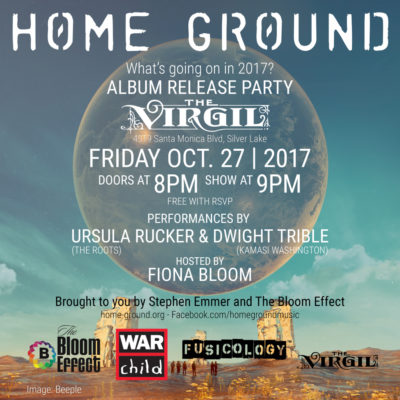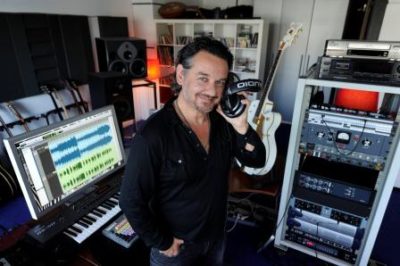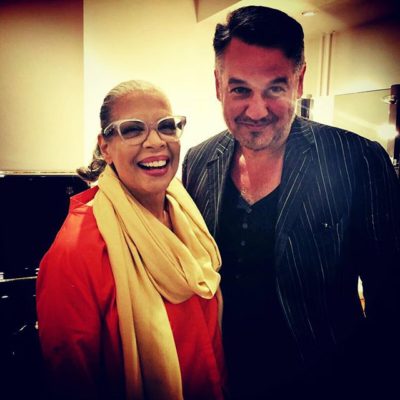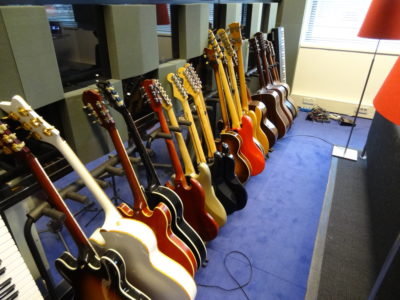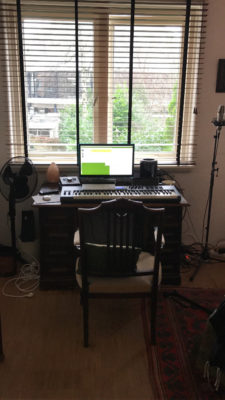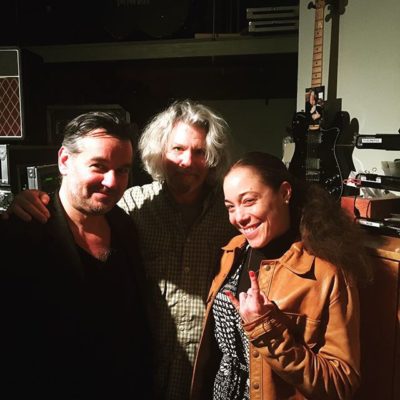Soul and Classical Meet in a Global Collab: Recording Stephen Emmer’s “Home Ground”
When Stephen Emmer holds the stateside launch for his album Home Ground on October 27 at the Virgil in LA, he’ll have done it with a little help from his friends. Make that a lot of help, from a global-spanning roster of star soul singers and musicians who collaborated long-distance on a particularly important record.
An accomplished Dutch composer, Emmer sought to step way outside of his home studio in the Netherlands to make a concept album with a message, which would also benefit the worthy non-profit War Child in its mission to empower children and young people in conflict areas. His impulse for action connected to a love of soul music and a further convergence with classical, the same sophisticated standpoint that created ‘70’s classics.
Emmer’s intellectual approach attracted an all-star international roster of soul singers to Home Ground, including Chaka Khan, Leon Ware, Patti Austin, Kendra Foster, Andy Bey, Mary Griffin, Frank McComb, Dwight Trible and Ursula Rucker.
How did he gather and produce this global contingent on a strictly DIY budget? And what differentiates the Global Music Award-winning Home Ground from just another set of protest songs? Emmer explains.
What makes “Home Ground” more than just an album – what does it represent beyond a collection of songs, and why is now such an important time for it to be coming out?
Home Ground is — or at least pretends to be — a so-called concept album, for which there is a kind of definition that a concept album has a general theme, topic or vision behind it. The collection of songs is related to that and thus make the songs serve as complementary to each other and interpreting the theme.
In this case the theme is a social awareness issue about where you feel your own home ground is; is it in your own country, your city or village, your house or is it close to your loved ones or is it in your own heart or head? Or as Captain Beefheart once said: “My head is my only home unless it rains.”
Today I feel this topic is ultra-relevant as we see that people move from one place to the other either out of necessity or preference, resulting in a massive worldwide diaspora with the aid of modern transport means more than ever before. I think, without wanting to get myself involved in many national politics, that this is one of the most relevant and interesting developments in the world.
What are some past concept albums or works you’ve been inspired by, that informed your approach to conceptualizing “Home Ground?”
Well, when I started to think about doing it, the world was still in a less fiery state then it is today. At that time, less than two years ago, artists seemed less interested in making that kind of music with a social awareness.
One day I realized that and I got inspired by the soul-music-with-a-message movement in the ‘70s. The main album from that period, to me, was Whats Going On? by Marvin Gaye. That was a record created from that same vision and against the will of his record company, Motown. Now we can safely say this album has become more of an artistic benchmark then most other records from the label at that time.
You were drawn to a convergence of soul music and orchestral styles to create this record. Has this been an underexplored combination up until now? What makes these two genres a powerful blend?
To come back at the What’s Going On? album here for a minute, what I really liked next to the social messaging in its lyrics was the sophistication of the music. The songs were structurally more complex, didn’t do the predictable thing there, its structures were more varied and complex, not doing a standard thing like chorus-verse-bridge-chorus-verse-chorus-chorus on a symmetrical basis of 2-4-2-4-2-4-4 with an average duration of three minutes at 45rpm…
No, they came with intros, went from A to Z in sometimes six minutes. also the way the orchestra was used by arrangers such as David van Pitte at Motown, but also by say David Axelrod or Charles Stepney, was a very experimental jazz meets pop/soul fusion at that time and I suddenly felt that fell of the radar in our age completely.
After listening to them I felt there was more effort needed still to bring that sonic approach more into today’s possibilities on both an artistical and technical level, as I feel a full-on retro approach wouldn’t be a good thing where it quickly becomes more of a nostalgic exercise only. Sure, you can use an analog path “like they did in the old days,” but why not combine that with the expanded sonic range of today’s technique?
I challenged myself to truly find a new synthesis between the old and the new. No either/or but rather an and/and approach in this!
This is an international project featuring an impressive range of soul singers, Chaka Khan, Leon Ware, Patti Austin, Kendra Foster, Andy Bey, Mary Griffin, Frank McComb, Dwight Trible & Ursula Rucker. How did you decide which voices were right for “Home Ground?”
In various ways really. The first songs I did for this were with a singer called Mary Griffin, and when she helped elevate the songs to something beyond what I had written, I started dreaming about what other male vocalist could also add that to the works. I found myself really liking the research for this (through online virtual crate digging) and I came across an — at that time — new record called The Epic by Kamasi Washington and heard a male singer who I thought was a wonderful baritone somewhere between two of my all-time favorite singers: Isaac Hayes and Scott Walker.
That put me on his track and I specifically started writing with his voice in my mind. The song “Under Your Spell” with Chaka Khan already existed, and she decided she could identify best with that specific one. Then it kinda snowballed from there, growing organically as the vocalists started to recommend others to me too, and we ended up with intergenerational collaborations galore!
You’re based in The Netherlands, where you spearheaded this international project. What are the workflows that you established to easily work with collaborators from around the world? What makes global collaboration easier than ever today, but what else keeps it challenging?
That’s right, my home ground is Amsterdam, but I’ve lived in London and New York for a while and in general do a lot of travelling. My youth I’ve also spent in Asia and South America.
I don’t think that this album project could have ever been achieved pre-Internet! Then it probably would have been taken much, much longer, as long as those older rock albums used to take, namely years on end (think Tusk or Songs in the Key of Life) and with a fitting limitless budget. There was no such thing here, as this one’s a DIY-deluxe project.
So yes, we’ve worked here with seven different singers in seven different places and with instrumentalists in the USA, UK and the Netherlands. Most of the instrumental work usually started in Amsterdam in my Pro Tools-based project studio, but for all acoustic instrumental recordings we went to the Wisseloord Studios in Hilversum (the Netherlands).
As for recording the singers we went to first record demo vocals in Amsterdam and London, then the final versions in LA, NY, Chicago, Philadelphia, Houston, Chicago…. Now, in some cases I could attend those sessions and some I couldn’t, and out of those I usually tried to attend via a Skype connection, but a few were also done without me being present in any way, however I had pre-production meetings for those, with both the vocalist and the engineer there.
Logistically it was a bit of a nightmare, but at least we could achieve something exceptional through doing it this way, also thanks to the wonders of the Internet of course. Imagine doing it with snail mail….
How is your own studio set up to maximize your creativity? From both an aesthetic and technical standpoint?
Over the years I changed a few times from working at home or having room outside of my private home. I guess both have their advantages and disadvantages. Now it’s all over the place actually — I record in my bedroom (just like how I started), I have my grand piano in the living room, I have my guitars in the dining room and upstairs I have my electronic setup.
I work primarily with Pro Tools for the last 15 years, and before that I was, in our country, one of the first to use an Atari computer with Cubase in the early ‘80’s. I guess in hindsight I’ve been really privileged to be both in the know about old and new school approaches, as I also know about tape, acoustics, outboard still. I’m a hybrid kinda guy.
Like many others at first I was so overwhelmed by the new possibilities, that I quantized all of my MIDI recordings then. When I hear that back now it sounds rather awful and rigid to me. So I guess my musical esthetic is one where you use each technique on only its own very best merits, and then combine it with another and seek for your own sonic identity through doing this.
That’s very well put! On a related topic, how would you describe your own approach to writing and recording and arranging: What are some key analog and digital tools that you’ve come to depend on in your studio?
As a multi-instrumentalist I once had to do with the few tools I had (Revox ¼-inch, Elka string, Korg MS 10 synth, Fender Precision bass, Ibanez guitar). But today I’m pleased to use a good acoustic piano, my trusted Bluthner mini grand, all of my UAD stuff, my Fender Telecaster 52re issue, my Fender Jazz bass, my classic outboard track, my Martin acoustic, Spitfire Audio sample libraries and lots of more sound design-oriented iPhone and iPad apps.
These days it can all start under the shower where I need to hum an idea into the music memo app of my iPhone, then accompany that with one of my go-to Swiss Army knives as mentioned above, and then when MIDI is needed I go to Logix Pro X. When audio dubbing is needed I go to Pro Tools and usually in Pro Tools is where the arranging is taking place, in my case.
I always have a new piece fully arranged and worked out already in detail at even the demo stages. I guess I’m really bad at doing rough sketching.
In your opinion, why is music more powerful when it’s tied to important messages like those of Home Ground, speaking to conflicts over land, religion, race, economic inequality and more? Why did you feel compelled to build an album around these themes?
As Nina Simone once said: Every artist needs to take in what’s going on around him or her in creating music. I’ve been an art-for-art’s-sake kinda guy for most of my youth, but now I think differently about these things. I now agree with Nina!
As a side note to this, what I still don’t like though is protest music where the music is not much more than the vehicle for the lyrics. In other words you are then excused to create some really boring music just to serve another purpose — that is not appealing to me one bit either. So both music and lyrics should be interesting and well taken care of before presenting it to the world.
When there is a real intrinsic connection between the two, then there is more meaning and intention interwoven with each other. That’s where I firmly believe that on even a subconscious level of perception listeners feel this, and can better identify with it.
“Home Ground” benefits the charity War Child. How do you feel musicians benefit by devoting some of their time to taking part in projects for musical good, i.e. in support of worthy charities or causes?
I feel we can benefit as musicians to not think that we should only just strive for personal success, but also for that of others you as a musician can identify with. It all adds up in the end and scientifically it has even been proven that giving brings you more fulfillment then taking. Again: best of both worlds, with no either/or necessary here.
When is the US Record Release for “Home Ground?” What might audiences expect when hearing these songs performed live?
The album has been released recently this summer and we will do small gigs in NYC and LA and who knows more into other cities in the USA in the direct future.
Any last thoughts on Home Ground?
I’m also very proud that credible urban music websites such as soultracks.com, okayplayer and afropunk in the USA have given a very positive response to the concept of the album. I feel like they’ve all confirmed that more of this is needed in the music world today.
— David Weiss
Please note: When you buy products through links on this page, we may earn an affiliate commission.







